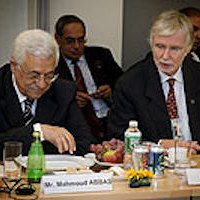![]()
Fri, Dec 16, 2011 | Middle East Forum | by Efraim Karsh
Haaretz: The Paper for Thinking People?
Originally published in the Hudson New York.
Of the countless threats of Arab violence in the run-up to the November 29, 1947 Partition Resolution and in its wake, none has resonated more widely than the warning by Abdul Rahman Azzam, the Arab League’s first secretary-general, that the establishment of a Jewish state would lead to “a war of extermination and momentous massacre which will be spoken of like the Mongolian massacre and the Crusades.”
Unfortunately, the longstanding failure to trace the original document in which the threat was made has given rise to doubts regarding its veracity, and by implication — the murderous Arab intentions: not least since the historical truth has been erased from public memory by decades of relentless pro-Arab propaganda.
Small wonder, therefore, that when the missing document was recently found, with an annotated full translation published in the Middle East Quarterly, which I edit, Haaretz columnist and self-styled “new historian” Tom Segev, who had spent a good part of the past two decades turning the saga of Israel’s birth upside down, went out of his way to whitewash Azzam’s threat and downplay its significance. “There is something pathetic about this hunt for historical quotes drawn from newspapers,” he wrote, without disputing the threat’s contents or authenticity. “Azzam used to talk a lot. On May 21, 1948, the Palestine Post offered this statement by him: ‘Whatever the outcome, the Arabs will stick to their offer of equal citizenship for Jews in Arab Palestine and let them be as Jewish as they like.'” He then quotes Ben-Gurion’s alleged description of the League’s Secretary-General as “the most honest and humane among Arab leaders.”
Azzam might have talked a lot, but there was no contradiction whatsoever between his public threats and private assertions. He privately told his Jewish interlocutors that their hopes of statehood would meet the same calamitous fate as the crusading state, and he reiterated this prognosis in the newly-discovered document. A week before the pan-Arab invasion of Israel on May 15, Azzam told Sir Alec Kirkbride, the powerful British ambassador to Amman: “It does not matter how many [Jews] there are. We will sweep them into the sea.” Even the actual Palestine Post report, from which Segev chose to bring a misleadingly truncated quote, had Azzam describe the Arab-invaded State of Israel as “a bridgehead into Arab territory” (that is, a crusader-like alien implant) that must be fought and destroyed for “otherwise they will be fighting us here, in Transjordan, and elsewhere in the Arab State.”
It is true that Azzam was prepared to allow survivors of the destroyed Jewish state to live as Dhimmis, or second-class citizens, in the “Arab Palestine” that would arise on its ruins (after all, his statement was made in a memo to the UN seeking to justify “the first armed aggression which the world had seen since the end of the [Second World] War,” to use the words of first UN Secretary-General Trygve Lie). But this can hardly be considered an indication of moderation. If anything, it affords further proof, if such is at all needed, that the gap between “the most honest and humane among Arab leaders” and the basic Jewish aspiration for national-self determination was as unbridgeable in 1948 as it is now.
But the story doesn’t end here. For Mr. Segev didn’t content himself with distorting the contents and significance of a key historical document but also sought to besmirch those who brought it to public attention by claiming that they lifted it from Wikipedia, to which it had supposedly been uploaded by one Brendan McKay — a professor of computer science at the Australian National University in Canberra.
This claim is not only false but the complete inversion of the truth. There was no trace of the newly-found document in Azzam’s Wikipedia entry at the time of the document’s publication in the Middle East Quarterly. On the contrary, noting the long-misconceived May 14, 1948, as the threat’s date — it was actually made on October 11, 1947, in the run-up to the partition resolution — the Wikipedia entry (accessed October 3) questioned its very existence:
One day after the State of Israel declared itself as an independent nation (May 14, 1948), Lebanese, Syrian, Iraqi, Egyptian, and Transjordanian troops, supported by Saudi and Yemenite troops, attacked the nascent Jewish state, triggering the 1948 Arab-Israeli War. On that day, Azzam is said to have declared: “This will be a war of extermination and a momentous massacre which will be spoken of like the Mongolian massacres and the Crusades”. However, Joffe and Romirowsky report that this “cannot be confirmed from cited sources”. Benny Morris, who had previously quoted it in his books, refrained from using it in his book 1948 “after discovering that its pedigree is dubious”.
In other words, rather than upload Azzam’s original threat to Wikipedia (or to any other publication for that matter) as falsely claimed by Segev, Mr. McKay, who on September 22, 2010 informed fellow Wikipedia discussants of having obtained a copy of the original interview in which the threat was made, failed to share his important discovery with the general public so as to keep Arab genocidal designs on the nascent Jewish state under wraps.
Why Mr. McKay agreed to pass a copy of the document to the evidently pro-Israel David Barnett, an American international politics student who had been chasing the document on his own, thus enabling it to see the light of day at long last — including, eventually, in Wikipedia — is not entirely clear: in a private communication, he declined my offer that his name be added as co-author as he didn’t “have a good opinion of MEQ”.
It is clear, however, that instead of minimizing Azzam’s threat and patronizing him in the worst tradition of the “white man’s burden” approach, Mr. Segev should have marveled at an important discovery that lays to rest one of the longest running debates on the 1948 war and helps his country reclaim the historical truth after decades of relentless distortion. But then, some journalists simply cannot handle the truth.
Nor, so it seems, can their editorial colleagues.
On October 24, three days after the publication of Segev’s article, I emailed my response to Aluf Ben, Haaretz‘s editor-in-chief, and was informed that the paper’s op-ed editor would be in touch. Yet it was only six weeks later (on December 5), after much haggling during which I agreed to cut the article’s length by half, that a Hebrew translation was (almost invisibly) published in the inside pages of the op-ed section. When I kept insisting that the original English-language article be also published I received the following response on December 12:
I’m afraid that we will not be able to publish this piece due to space limitations in the English edition of the newspaper. Our paper is considerably smaller than the Hebrew edition and we give priority to pieces published on the main editorial page of the Hebrew paper, which is why you were passed over last week. I had hoped to find a spare slot this week, but this has not been possible.
I would be pleased to be in touch with you directly next time one of your pieces is published on our opinion pages, so that I can receive the original English version in time to consider it for the same day’s newspaper.
It is doubtful whether the editors believe their own words. Not only are space limitations wholly irrelevant in the case of an online publication, which is what Haaretz.com essentially is, but the editors have had my article for seven weeks, which should have given them more than ample opportunities for a timely publication.
Worse: the fact that Haaretz took the trouble to have Mr. Segev’s Hebrew-written piece translated to English, and to have my response translated to Hebrew, while refusing to post an English-written article on its English-language website — where the main defamatory damage to my professional reputation was intended to be done — cannot but be seen as a blatant cover up of a professional misconduct by one of its most senior columnists.
While there is nothing new or surprising in a paper’s refusal to own up to its misreporting or publish facts and analysis contradicting its political line, it is ironic that “the paper for thinking people,” as Haaretz habitually flaunts itself, would engage in the shoddy business of truth suppression and mouth shutting at a time when it self-righteously fights an alleged attempt by the Israeli government to do precisely that.
Efraim Karsh is director of the Middle East Forum, research professor of Middle East and Mediterranean Studies at King’s College, and author, most recently, of Palestine Betrayed.



 RSS
RSS











Haaretz: The Paper for Thinking People? | Middle East, Israel, Arab World, Southwest Asia, Maghreb http://t.co/jr5fNaHq
Haaretz: The Paper for Thinking People? | Middle East, Israel, Arab World, Southwest Asia, Maghreb http://t.co/jr5fNaHq